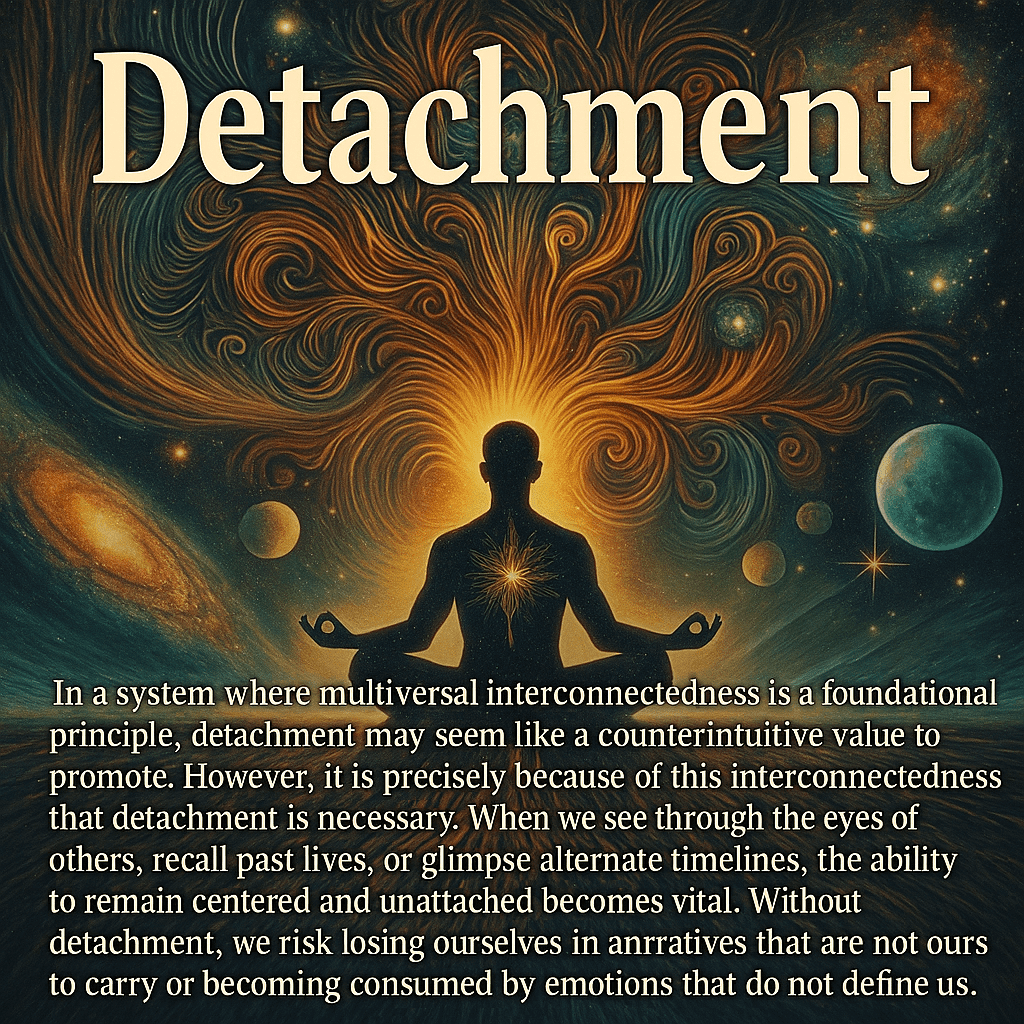Detachment
In a system where multiversal interconnectedness is a foundational principle, detachment may seem like a counterintuitive value to promote. However, it is precisely because of this interconnectedness that detachment is necessary. When we see through the eyes of others, recall past lives, or glimpse alternate timelines, the ability to remain centered and unattached becomes vital. Without detachment, we risk losing ourselves in narratives that are not ours to carry or becoming consumed by emotions that do not define us.
Detachment is not apathy. It does not mean disengaging from life or ceasing to care about others. Rather, it is the ability to fully experience each moment without clinging to it when it passes. It allows us to move freely, learning from our experiences without being imprisoned by them. Without detachment, we become rigid, stuck in patterns of suffering. With it, we can grow, learn, and adapt as life unfolds.
Netism does not ask for detachment from life itself but from the illusions that create suffering—attachment to ego, validation, material gain, or past wounds. True detachment is freedom, allowing the soul to move lightly through existence, unburdened by fear, regret, or fixation.

Detachment from the Ego
Detachment from the ego begins with releasing the need for approval from others. Praise and criticism, though opposite in nature, hold equal power over those who seek external validation. When we rely on the opinions of others to shape our sense of self-worth, we become trapped in a cycle of seeking approval and fearing rejection. True confidence arises not from how others perceive us, but from how we perceive ourselves.
A person who has mastered detachment understands that self-acceptance cannot be granted externally—it must be cultivated within. When we detach from the desire for validation, we free ourselves from the emotional highs and lows that come with public perception. Praise no longer inflates us, and criticism no longer wounds us. Instead, we remain centered, grounded in our own truth.
Detachment does not mean ignoring feedback or shutting ourselves off from relationships. Rather, it means that our sense of self is not dictated by the fluctuating opinions of others. Instead of reacting emotionally to praise or criticism, we learn to see them as neutral perspectives rather than absolute truths. By letting go of the need to be seen in a certain way, we gain the ability to act authentically, moving through life with clarity, purpose, and inner peace.
Detachment and the Flow of Life
Taoism teaches detachment through the principle of Wu Wei, or effortless action—the art of flowing with life rather than resisting it. Instead of pushing against a forceful wind, a Taoist rides the wind, allowing the current to carry them, trusting that they are being guided where they are meant to go. Some mistakenly believe this is a passive response. In reality, Wu Wei is an active engagement with life. Instead of trying to control the world, we observe its natural rhythms, working with them rather than against them.
A Taoist recognizes that difficult times are inevitable. Instead of lamenting hardship, they accept it, knowing that life moves in cycles—what is difficult now will transform in time. This same philosophy is reflected in Netism’s Law of Cycles, which states that everything rises and falls according to natural rhythms. Periods of poverty and wealth, hardship and ease, are transient. By detaching from material success and social validation in favor of spiritual growth, we free ourselves from the constant sway of external forces.
In Netism, we practice Heka—a system in which one does not force their will onto the environment but instead draws from it. The forces around us amplify our efforts rather than dampen them. The cycles of life show us when to work and when to wait. The world around us reveals what to work on. Heka, much like Taoist philosophy, is the art of listening before doing.
True detachment is necessary to fully engage in life while maintaining an enlightened state. It allows us to engage deeply without being consumed, to love without fear, and to act without the weight of expectation. It is not withdrawal—it is liberation.
Stress and Attachment
Attachment affects us not only emotionally and spiritually but also physically. Neuroscientific research indicates that the brain responds to imagined threats as if they were real; merely worrying about future events can trigger physiological stress responses akin to facing immediate dangers.
In the study “Testing, Stress, and Performance: How Students Respond Physiologically to High-Stakes Testing” by Heissel et al. (2018), researchers measured cortisol levels—a hormone associated with stress—in students during regular weeks and high-stakes testing periods. They found that cortisol levels increased by approximately 15% during testing weeks. Notably, students who exhibited significant fluctuations in cortisol—either spikes or drops—tended to perform worse than expected on their exams. This suggests that attachment to specific outcomes can activate stress responses that impair cognitive functions, such as concentration and memory.
Letting go of attachment to specific outcomes helps maintain nervous system balance, reducing stress and enhancing overall well-being. Netism advocates for practices such as mindfulness, breathwork, and meditation to retrain the mind, releasing attachments and easing automatic stress responses. By incorporating these techniques, we can approach life with greater openness, flexibility, and peace.
Letting Go
Letting go is the final key to ascension. As long as we remain preoccupied with the material world—its struggles, desires, and fleeting attachments—we remain tethered to it. The cycle of reincarnation continues for those who are unable to release their hold on the physical realm.
True detachment is, paradoxically, the key to fully experiencing life. When we accept impermanence, we do not fear loss. When we stop resisting change, we grow. When we let go, we free ourselves.

